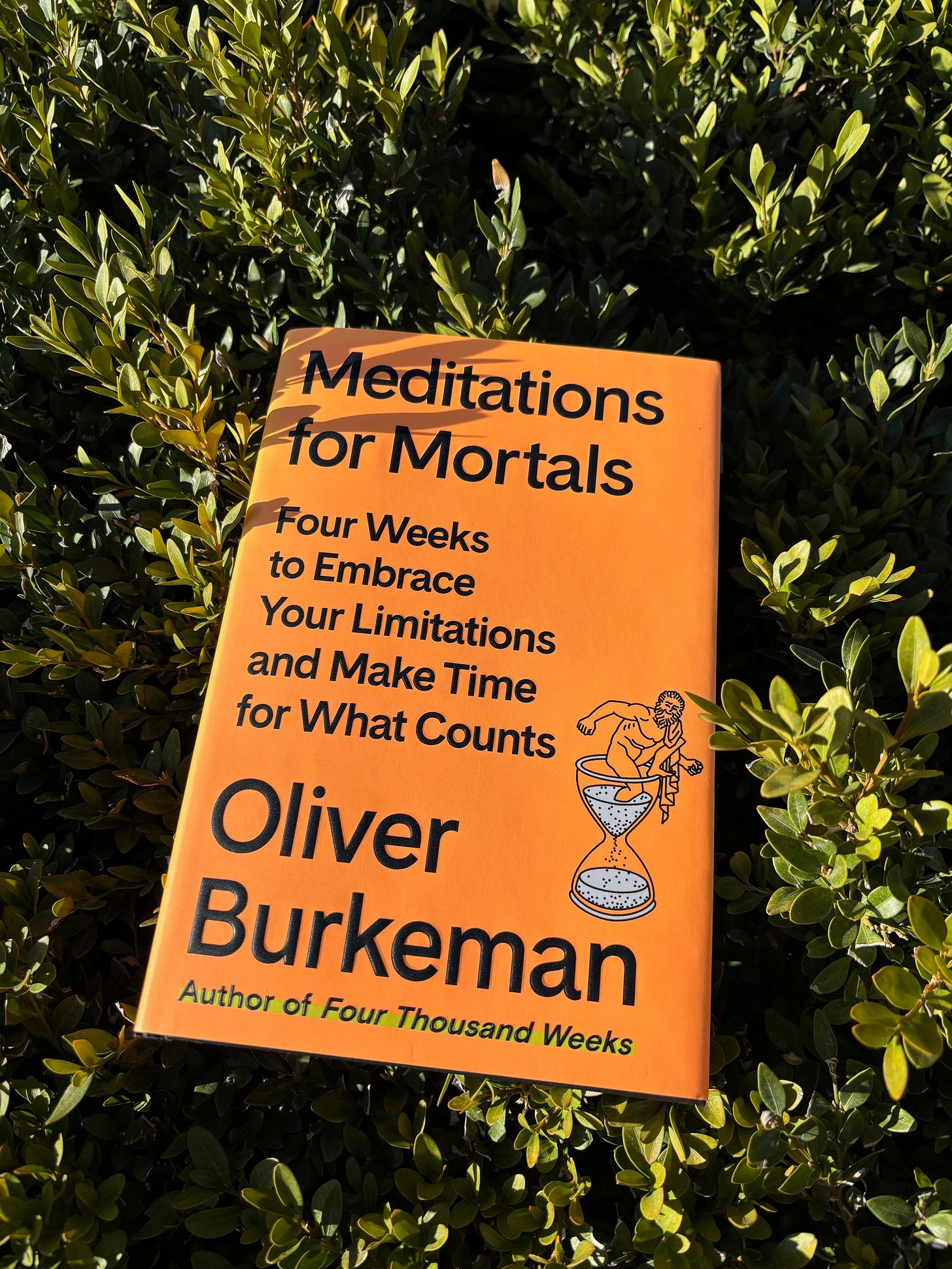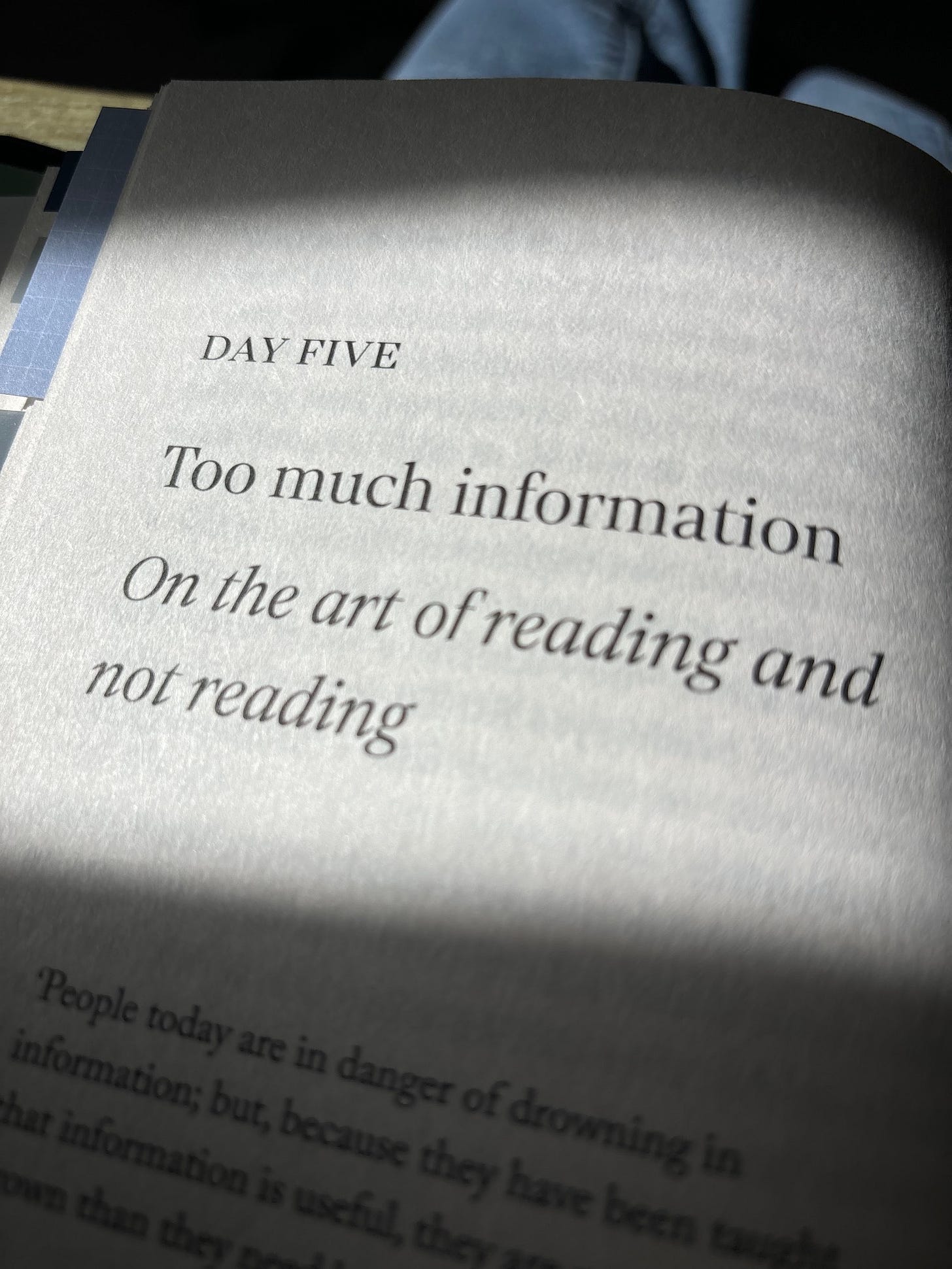Reading Guide: Meditations For Mortals
Points to ponder as (or after) you read Meditations For Mortals by Oliver Burkeman, our April book club pick!
I’ve written before about how, at first glance, Oliver Burkeman’s writing appears like it would be in deep contradiction to my own personal beliefs. With chapter headings in Meditations For Mortals like “It’s Worse Than You Think” (right on Day 1!) and “Stop Being So Kind To Future You,” for instance, it would seem at first glance that he’s directly opposing two of my personal core values, positivity and kindness.
But this is why we read the full source material and not just the headline, right?
And when it comes to Burkeman’s writing, I am always glad I do read on. His philosophies tend to actually align with mine so well, and I end up loving the jolt of recognition I feel as I realize what I thought was in opposition turns out to be just a different way of approaching the same underlying concept.
That overall concept (one of them, anyway), in the case of Meditations For Mortals, is intentionality - also our theme for April book club.
Since I've already written an in depth review of Meditations For Mortals (which you can read here), today we’ll jump right into the reading/reflection guide. I’ve created these questions for you to reflect on while or after you read; they can also provide the launchpad for our book club discussions, which take place with Your Best Self book club at Dog-Eared Books on April 16 and with the Reading And Purpose Nonfiction Book Club on April 17. We’ve been having such rich, fun, inspiring discussions in book club so please feel free to join us at any time!
Reading Guide / Reflection Questions
Theme: Intentionality
Book: Meditations For Mortals by Oliver Burkeman
Before you begin reading, reflect for a moment on your current relationship with time, how you tend to spend yours, and the fact that we have a finite amount of it. How much do you feel you’re intentional with time vs. ‘living on autopilot’? What differences do you notice, if any, when you are ‘intentionally intentional’ with your time?
One of my favorite aspects of Burkeman’s writing is how he continually ties his ideas back to living a meaningful life - whatever that looks like for each of us. What does a meaningful life look like for you? What seems to naturally or easily bring you meaning? How do you create meaning in areas where it’s not as natural/easy?
Right from the introduction, Burkeman reminds us that even though we may strive for control - of our time, our outcomes, etc. - so much of a good life happens outside of our control. “A football match is exciting because you don’t know who will win; a field of intellectual study is absorbing because you don’t yet have a handle on it all,” he writes. How does this land with you? Does it feel liberating? Frustrating? Something else?
Although Meditations For Mortals discusses ‘ways of being’ more than time management ‘rules,’ he does suggest some of those now and then, too. One that jumps out to me is his ‘three-to-four-hour rule,’ which basically revolves around focusing intensely during your peak energy hours rather than half-heartedly throughout the entire day. (Keller & Papasan suggest something similar in The One Thing as well, which I wrote about here.) What is your experience with this way of operating? When in the day do you tend to have the most energy? Does this strategy - or some variation of it - feel realistic within your work, roles, and responsibilities?
“Almost everything that happens, according to an adage of uncertain origin, is either a good time or a good story,” Burkeman states while discussing the upsides of unpredictability. I hadn’t heard this adage before (or at least didn’t remember it) and actually find it quite helpful! What is your reaction? Are there other sayings, adages, or quick quotes that you find helpful and/or regularly call to mind?
On Day 5, Burkeman writes about the abundance of information we now have at our fingertips and how that impacts us. I feared I was going to feel called out by this entry, but I actually loved the tips he shared here, such as treating your to-read pile like a river that you can choose from as things float by rather than as a bucket that you have to empty. What do you think of this suggestion? Are there other places where we might apply a similar philosophy? What have you found helpful in continuing to read, learn, and take in information without being completely overwhelmed by it?
I recently posted an article about productivity (you can read it here). Does wanting to be productive contradict being meaningful/living in the moment? Can we be ambitious + driven and present + mindful?
What are your reactions/thoughts to this statement from early in the book: “Few things are more appealing, when you’re hoping to change your life, than a new system for doing so. But that allure can lead you astray. Almost nobody wants to hear the real answer to the question of how to spend more of your finite time doing things that matter to you, which involves no system. The answer is: you just do them.” Do you agree? Can it really be as easy as that? Do you sometimes find you prefer a system, program, or step-by-step plan rather than just jumping in and doing the thing?
Day 24 is all about ‘scruffy hospitality’ - such as inviting people over even if your home isn’t in perfect order and cleaned to a white-glove standard. How easily are you able to practice this, or to let people see your imperfections in general? Does the desire to appear successful or put-together get in your way of truly connecting with others? What can help us move past this?
In the final entry, Burkeman addresses the pressure we may feel to ‘do something extraordinary with our lives.’ This can relate to what we talked about in our March book club, where it might seem like confidence requires being loud, charismatic, and/or extroverted - which, as we also discussed, is not accurate. He writes, “Why shouldn’t an anonymous career spent quietly helping a few people get to qualify as a meaningful way to spend one’s time? Why shouldn’t an absorbing conversation, an act of kindness, or an exhilarating hike get to count? Why adopt a definition that rules things out?” What is your reaction to this? What does your personal definition of success or the good life include? Does this connect with your response to question #2 above, or is it different?
Of the 28 entries included in Meditations For Mortals, which 2-3 resonate with you the most? Are there any you disagree with?
What are your top takeaways from this book and/or our discussion? What will you do, or do differently, based on the reading/discussion?
If you’re a member of the Reading And Purpose Nonfiction Book Club (an automatic benefit to paid subscribers), watch your email for additional resources and further details about upcoming events. If you’re not a member yet and would like to be, simply upgrade your subscription and you’re in!
********
Christi Hegstad, PhD, PCC, and self-proclaimed book nerd, is a certified coach who helps achievers work with meaning, live with purpose, and reach bold + difference-making goals. Feel free to share your questions, comments, or topic/book suggestions below or via email to readingandpurpose (at) gmail (dot) com.
Please note books mentioned may include affiliate links; if you click through to purchase, I may earn a small commission at no extra cost to you.
Reading And Purpose is a reader-supported publication. Thank you for being here!






I love how you’ve broken down your March reading wrap-up into clear categories. It’s inspiring to see such a diverse mix of genres and topics, making it easier to think about expanding my own reading list. Thanks for the great recommendations and insights!